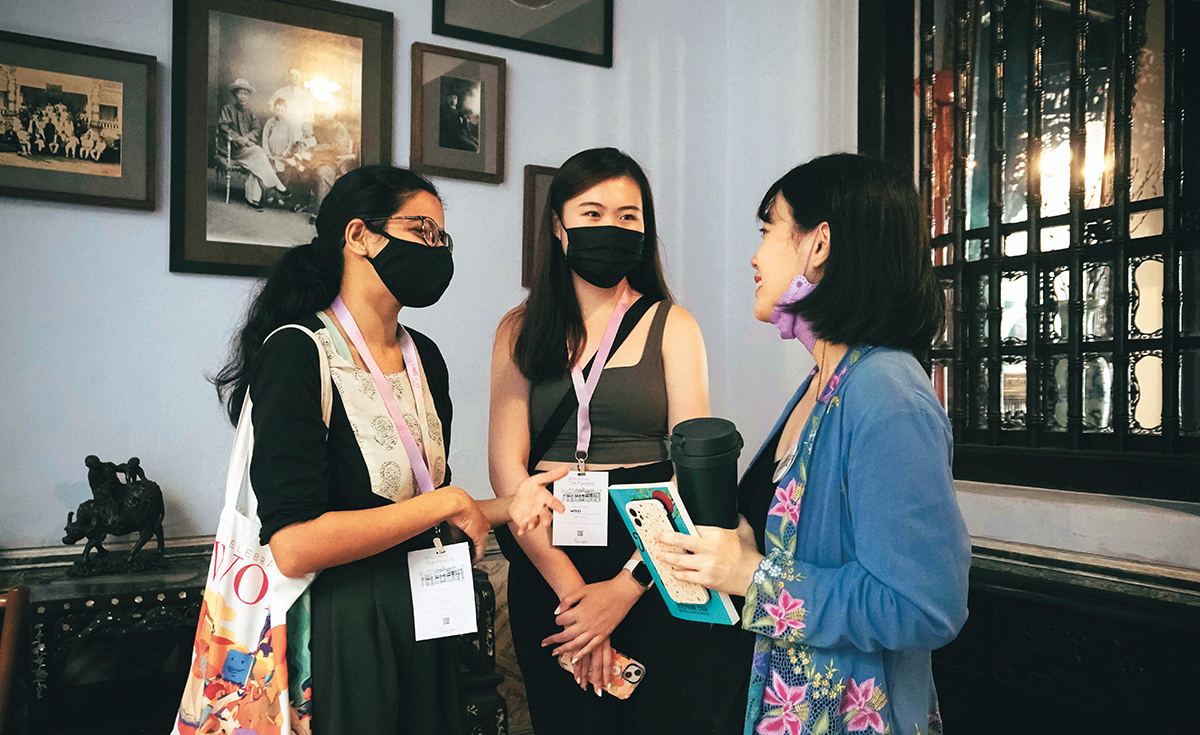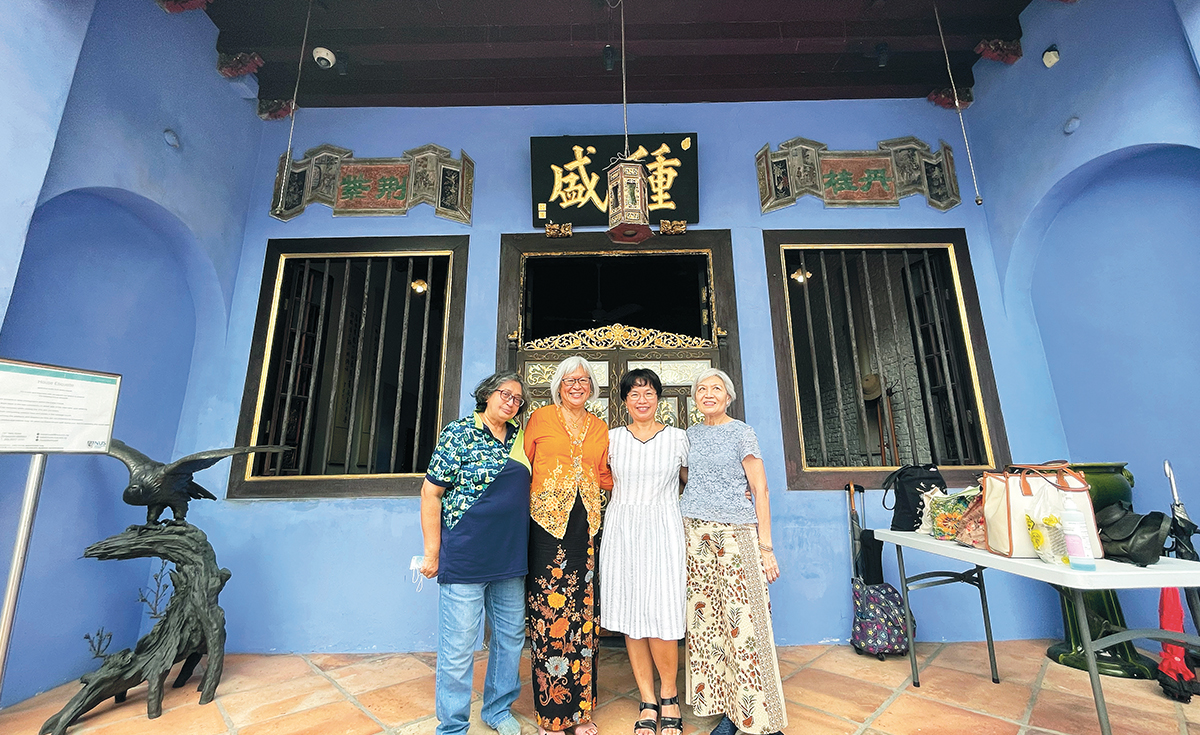Bridging the Gap through Dialogue
Through the lens of local writer Ms Josephine Chia, attendees at the Around the Tok Panjang chat on 13 August gained insights into gender-related issues within the Peranakan culture.

Whether it is discussing the sharing of child-raising responsibilities, to overcoming pre-defined beauty standards for women, or looking at the multiple roles that men and women play in today’s society, it is important that we do not alienate men when engaging in discussions about gender equality.
These were some key takeaways at the
Around the Tok Panjang chat, which was held at NUS Baba House on 13 August. The event was initiated by the Idea Co.’s GEN, a for-impact organisation that works to close the gender gap and bridge generational differences. To this end, it has launched a series of events with NUS Baba House that runs from August to December 2022. Named
Around the Tok Panjang, the series aims to bring together community members and academics in Singapore to further understand and contextualise gender-related conversations within the Peranakan culture.

The 13 August event was moderated by TEDxSingapore’s lead curator and GEN’s co-founder, Ms Vivian Lim, and led by local writer Ms Josephine Chia, who has written widely about her Peranakan upbringing and
kampong culture. Instead of researchers having dialogue sessions about what culture and gender mean, Ms Lim said she wanted to bring the community in and share their stories. She invited Ms Chia to discuss and dive deeper into how Peranakan women are depicted in her works and literature.
Having grown up in a
kampong during the 1950s, Ms Chia kick-started the conversation by recounting how her mother, who was born into a Peranakan family in Malacca, was a key influence in her life. “I felt that I owed her a lot because without her, I would not have been educated. Because during that period, education was mostly reserved for boys,” shared Ms Chia. And while studying in England — which was considered a privilege — she was told that her mother had developed Alzheimer’s disease. “So I felt guilty about not looking after my mother, because I was away. And so I thought I would write a book to show how much I respected her,” she revealed. Ms Chia also documented her younger sister’s challenges in looking after her mother in one of her books. “My sister sometimes found it burdensome to have our mother in the home, and I do not blame her. She had to put up with a great deal on a daily basis and was the ‘quiet heroine’.”
 The session attracted academics and members of the public keen on exploring gender issues.
The session attracted academics and members of the public keen on exploring gender issues.
Debunking cultural and gender stereotypes
When Ms Lim asked Ms Chia if she was one of those “rich Peranakans”, she replied that she had to overcome the stereotype of all Peranakans being rich. Also, many people associate Peranakans with people of Chinese extraction, not realising that there are also Peranakan Arabs, Peranakan Dutch and Peranakan Indians. “A number of the Peranakan Chinese in Malacca and Singapore were merchants who established businesses in these places and so they did indeed become very wealthy. And much of the political eclogue in Singapore in the early days stemmed from those who were of mainly Peranakan descent — and this has led to the idea that a lot of Peranakans are very wealthy and influential,” Ms Chia explained. “When I used to meet some of the Peranakans at social events, I used to feel terrible because I was a ‘poor Peranakan’. Nobody heard of where we come from,” said Ms Chia. Interestingly, Ms Chia — who always sensed that her mother was different from the other
kampong women — learnt that her mother used to play the violin and that she had come from a wealthy family.
During the engaging 80-minute chat, Ms Chia, who incorporates social consciousness into her works, stressed that education makes a difference in how a woman becomes “somebody”. “Back then, a woman’s role was to be a breeder, and you just were supposed to have as many kids as possible. I would say almost 90 per cent of the women, when I was growing up in the 1950s and 1960s, were poor and didn’t have an education. It was only when the (People’s Action Party) came in that schools were set up and education was made compulsory — and this led to greater opportunities,” said Ms Chia. In her book
Kampong Spirit, Ms Chia narrated the story of her best friend, Paradi, an Indian woman who never received an education. “My father used to wonder what the point of girls going to school was, because ‘you will poison your mind and you will have an opinion’. It was really tough. And I had to fight hard for my education,” shared Ms Chia.

 Participants shared their views and exchanged insights during the chat.
Participants shared their views and exchanged insights during the chat.
Ms Chia also documented the feisty mother-in-law, who was the family’s matriarch and made life difficult for the daughter-in-law in her work, Mother-In-Law Son. That story resonated with many Merdeka Generation readers who wrote in to say they had the same experience. “It was easier for men back then, who worked to bring home the money and they gave their wives control over how the house was run. But once their own sons got married, these women actually turned on their own kind and would become the nasty, controlling mother in-law,” shared Ms Chia.
The importance of open conversations between the genders
During the Q&A session, Ms Chia also answered questions on gender equality and said women and men are co-dependent, and must learn how to reason with each other. “For example, a working woman who wants to have children will need to discuss with her husband on how they can share child-raising responsibilities,” said Ms Chia. “As a Peranakan woman, it’s nice that we learn domestic skills sewing and cooking. But as we are also educated, we can now have an open discussion with men instead of fighting with them. For example, we can tell them that we need their help to change our kids’ diapers at night since we are also working,” Ms Chia added. She also answered a question on what a Peranakan woman should look like and why women need to be comfortable in their own skin. “I’m Peranakan so I do not look like the fair-skinned Chinese beauty typically depicted in our society. I’m tanned as I love the outdoors and I do sports like hiking,” she said. Finally, Ms Chia ended the conversation by saying that life and culture constantly evolve. “For example, I might wear a Peranakan costume that’s made from a different material now instead of the traditional fabric, simply because it’s more comfortable. But a ‘purist’ Peranakan might frown upon that,” she said, adding that it was important to embrace change.
The need to bridge gender inequality and discrimination
- In 2021, 13 per cent of Singapore companies were helmed by a female CEO, and more women have taken on leadership roles. But women still face disadvantages, according to the White Paper on Singapore Women’s Development, which was debated in Parliament earlier this year.
- From a societal standpoint, gender inequality is still a pertinent issue in Singapore. In a study by Ipsos, 24 per cent of Singaporeans deny the existence of gender inequality and believe that feminism does more harm than good, and that feminism has resulted in men losing out in political, economic and social settings.
- Gender discrimination in the workplace has also been a prevalent issue in Singapore. A survey by NTUC U Women and Family (U WAF) and People’s Action Party Women’s Wing (PAP WW) found that 10 per cent of female respondents had experienced being passed over for promotion or career advancement due to their gender.
- The latest data from YouGov Profiles indicates that gender equality in the workplace remains elusive, with seven in 10 women agreeing that men and women experience unequal treatment at work. And women in specific sectors, such as construction, healthcare and engineering, are more affected by gender disparity in the workforce.
Text by: Audrina Gan. Photos courtesy of Idea Co.